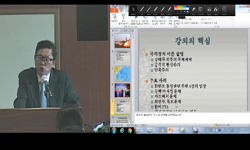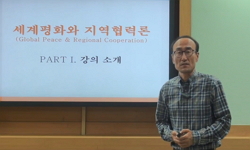The major purpose of this study is to explain the role of epistemic community in conducting a new diplomacy for the Korean unification as well as the peace and prosperity in Northeast Asia in the information age. This study is based on three premises ...
http://chineseinput.net/에서 pinyin(병음)방식으로 중국어를 변환할 수 있습니다.
변환된 중국어를 복사하여 사용하시면 됩니다.
- 中文 을 입력하시려면 zhongwen을 입력하시고 space를누르시면됩니다.
- 北京 을 입력하시려면 beijing을 입력하시고 space를 누르시면 됩니다.
https://www.riss.kr/link?id=T13558763
- 저자
-
발행사항
인천 : 인하대학교 대학원, 2014
-
학위논문사항
학위논문(석사) -- 인하대학교 대학원 일반대학원 , 정치외교학과 , 2014. 8
-
발행연도
2014
-
작성언어
한국어
- 주제어
-
DDC
327.51 판사항(21)
-
발행국(도시)
인천
-
기타서명
A New Diplomacy for the Korean Unification in the Information Age : The Role of Epistemic Community for the Korean Unification and the Prosperity in Northeast Asia
-
형태사항
vii, 131 p. ; 26cm
-
일반주기명
지도교수:김용호
인하대학교 논문은 저작권에 의해 보호받습니다.
참고문헌 : p.123-131 - 소장기관
-
0
상세조회 -
0
다운로드
부가정보
다국어 초록 (Multilingual Abstract)
The major purpose of this study is to explain the role of epistemic community in conducting a new diplomacy for the Korean unification as well as the peace and prosperity in Northeast Asia in the information age. This study is based on three premises for the necessity of introducing a new diplomacy under the rapidly changing international and Northeast Asian situations: 1) The new international environments strongly suggest that we need a new approach to promoting the Korean unification; 2) It is necessary to develop a network of transnational experts across national borders for solving problems related to the Korean unification and promoting peace and prosperity in Northeast Asia in the highly globalized world; 3) The peaceful unification of the Korean peninsula could not be achieved without consolidating the peace and prosperity in Northeast Asia.
In a way to demonstrate the necessity of a new diplomacy for the Korean unification, this study made a critical review on the ROK government's unification diplomacy from historical perspective. The government's current unification diplomacy which has been focused on only the state-to-state relationship doesn't reflect some significant changes in the international society. Since the rapid developments of globalization and information technology have been changing the international environments, the actors, contents, counterparts of diplomacy have been changed and diversified, even though states or governments still play the predominant role, functioning as the most important official channels for the Korean unification. Therefore, we need to develop epistemic community as a new actor of unification diplomacy.
An epistemic community is a transnational network of top experts who are working in the academia, mass media, NGOs, as well as central and local governments with extensive knowledge and strong influence on the policy-making process in their related fields. It must be emphasized that Northeast Asia Epistemic Community would share the vision of the Korean unification as well as peace and prosperity in Northeast Asia, find out new agenda, make some joint efforts to seek some solutions, and finally draw national and international society's attentions for domestic and regional cooperation. The epistemic community's ultimate goal is to institutionalize the mechanism of the peace and prosperity in Northeast Asia including the Korean peninsula.
As a new actor of unification diplomacy in the information age, ‘Northeast Asia Epistemic Community’ is effectively going to play a role at the international, domestic, and inter-Korean levels. At the international level, Northeast Asia Epistemic Community would serve as a channel for the ROK government's unification diplomacy and promoting peace and prosperity in Northeast Asia by making neighboring states understand the unification benefits and contributing to build the regional identity of Northeast Asian states. At the domestic level, the epistemic community would form and lead public opinions in favor of consolidating the South Korean people's strong will toward Korean unification as well as offer some policy advices for the government decision-makers. Furthermore, the members of Northeast Asia Epistemic Community at the inter-Korean level will share the vision of peaceful unification, and establish a high level of trust between the actors who are involved in and implement the process of gradual unification in the future.
In a way to examine the possibility of developing ‘Northeast Asia Epistemic
Community’, this study analyzed the role of epistemic community in the process of European integration and the unification of Germany. The successful case of German unification strongly implies that the epistemic community in Europe greatly contributed to the German unification, although the inter-German epistemic community was yet to develop in the process of the German unification, which brought out some negative consequences in the post-Unification German. Therefore, it is necessary to seek the Korean unification in the context of promoting peace and cooperation in Northeast Asia, in which epistemic community would certainly play an important role.
When we analyzed and evaluated the current situation of the Northeast Asia Epistemic Community, most of the cases are just platforms for the simple dialogue across countries in this region without any significant influence on the national and regional policy making. Nevertheless, we can find some facilitating factors to develop the epistemic community in the future. For example, Track 2 or Track 1.5 diplomacy conducted by government and non-government experts are recently becoming more and more activated. Compared to the past, the number of collaborative research and international conference has been increasing, and the field of cooperation has been diversified as well. Meanwhile, there are some obstacles, such as Epistemic Community’s weak political influence at the domestic level, lack of continuity and effectiveness of organizing international conferences and joint projects across countries in the region, as well as exerting political influence at the regional level. In addition, it is yet to build up a network of experts in North Korea who share the vision of peaceful unification of the Korean peninsula as well as peace and cooperation in this region with the mind of openness and reforms.
국문 초록 (Abstract)
본 연구의 목적은 정보화시대에 새로운 외교방안으로서 동북아 평화번영과 한반도 통일을 위한 인식공동체(epistemic community)의 강화 방안을 제시하는 것이다. 이 연구는 주로 현실주의 국제...
본 연구의 목적은 정보화시대에 새로운 외교방안으로서 동북아 평화번영과 한반도 통일을 위한 인식공동체(epistemic community)의 강화 방안을 제시하는 것이다. 이 연구는 주로 현실주의 국제정치이론에 기반을 두고 있는 기존의 통일외교방안으로는 정보화 및 세계화 시대에 통일을 달성하기 어렵다는 문제의식에서 출발하고 있다. 구성주의적 시각을 바탕으로 새로운 통일외교로서 본 연구가 제시하는 인식공동체(epistemic community) 방안은 다음과 같은 3가지 전제에서 출발한다: 1) 정보화시대에는 새로운 통일외교 방안이 필요하다; 2) 정보화시대 외교는 국경을 초월한 전문가 네트워크가 필수적이다; 3) 한반도 통일과 동북아의 신질서 구축을 동시에 추구할 때 한반도 통일이 용이하다.
이러한 전제에 따라 본 연구는 첫 번째, 시대적 변화를 반영하지 못하고 있는 기존 통일외교를 비판하고 이에 대한 대안으로서 ‘인식공동체’(epistemic community)의 역할을 소개하였다. 우리나라 통일외교의 역사적 전개과정을 국제체제의 역사적 변화의 관점에서 살펴본 결과 기존의 통일외교가 여전히 국가에만 매달려 있는 것을 발견하였다. 세계화와 정보화를 비롯한 국제체제의 변화로 인해 외교의 행위자, 대상, 내용이 다원화·다양화․다변화·다층적으로 전개되고 있는 점을 고려할 때 현행 통일외교가 새로운 외교환경의 흐름에 지체되고 있다는 것을 의미한다.
이제 세계화와 정보화시대에 걸맞게 국가 중심의 통일외교를 다원화, 다양화, 다변화, 다층적으로 확대하기 위해 동북아를 중심으로 인식공동체를 형성․발전시켜 나가야 할 것이다. 본 논문의 일차적인 목적과 관심은 정보화 시대의 통일외교의 새로운 방안을 제시하는 것이지만, 한반도 통일은 필수적으로 동북아 신질서의 태동을 의미하는 것이기 때문에 한반도를 포함한 동북아 전체의 평화와 번영을 함께 고려하지 않으면 주변국들의 지지와 협조를 없어낼 수 없을 것이다. 이에 따라 본 연구에서는 통일외교의 범주를 한반도를 넘어 동북아 평화번영으로 확대하고, 이러한 외교목표를 달성하기 위한 인식공동체를 가리켜 ‘동북아 인식공동체’라고 명명하였다.
동북아 인식공동체는 한반도 통일을 포함한 동북아 지역의 평화와 번영을 위한 비전을 공유한 가운데 각 분야에서 전문성과 능력을 인정받아 국내외적 정책결정 과정에서 영향력을 행사하는 전문가 집단의 네트워크를 일컫는다. 동북아 인식공동체는 국경을 초월하여 한반도 통일을 비롯한 동북아의 평화 번영과 관련된 이슈를 개발한 후 각 나라와 국제사회의 주요 정책 어젠다로 채택하도록 하며 이에 대한 효율적인 해결책을 모색할 수 있을 것이다. 특히 정보화시대에는 국경을 초월한 정보 및 지식의 교류를 활성화시킬 수 있는 기술적․물리적 여건이 마련되어 있기 때문에 인식공동체를 활용할 때, 현행 통일외교가 지닌 정부 대 정부 위주의 외교행태를 다변화시킬 수 있을 것으로 기대된다.
두 번째, 앞으로 ‘동북아 인식공동체’가 국제적 차원, 국내적 차원, 남북 차원에서 각각 어떤 역할을 수행해야 하는지를 구체적으로 논의하였다. 동북아 인식공동체는 주변 4국에게 통일편익을 이해시키고 동북아 정체성 정립의 토대를 제공함으로써 동북아 협력에 기초를 마련할 수 있다. 국내적 차원에서는 정책결정자들에게 정책조언을 제공하고 통일에 순기능적인 여론을 형성 및 주도하며 국민들의 통일의지와 역량을 고취시킴으로써 통일외교를 뒷받침할 수 있다. 뿐만 아니라, 남북 간 민족 평화통일의 비전을 공유하면서 남북통일의 당사자들 간 신뢰를 구축하여 점진적인 통일 프로세스를 이행하는 역할을 할 수 있다. 특히 동북아 인식공동체는 경제적 상호의존과 정치·군사적 갈등이 병렬적으로 나타나는 동북아 역내 국가들 간의 행위에서 협력 가능한 공동의 이익을 도출해냄으로써 평화구축 및 제도화 과정에서 촉매제 역할을 기대할 수 있다.
세 번째, 동북아 인식공동체의 가능성을 살펴보기 위해 유럽통합 과정과 독일통일 과정에서 인식공동체가 어떤 역할을 했는지를 분석한 결과, 동북아 인식공동체가 동북아 평화번영과 한반도 통일을 동시에 추구할 때 두 가지 과제가 서로 상승작용을 일으킬 수 있다는 점을 도출할 수 있었다. 또한 최근 동북아 인식공동체의 실태를 분석한 결과, 대부분의 경우가 지속성과 실효성이 부족한 단순한 전문가들 간 대화의 장(場)에 더 가까웠다. 그럼에도 정부 간 합의의 결과로 트랙2 또는 트랙1.5 차원의 회의가 활성화되고 있을 뿐만 아니라, 과거에 비해 동북아 전문가들 간 공동연구 및 국제회의가 증가하고 있으며 그 협력분야 또한 다양해지고 있다는 점에서 동북아 인식공동체의 발전 가능성이 높다고 전망하였다. 한편, 국내 인식공동체의 정책영향력의 미흡, 동북아 전문가 네트워크의 편중 및 집중 현상, 남북 인식공동체 형성의 제약 등은 장애요인으로서 이를 극복하여 동북아 인식공동체로 발전 및 강화할 수 있는 방안이 마련되어야 할 것이다.
목차 (Table of Contents)
- 제1장. 서론 1
- 제1절. 연구의 목적 및 방법 1
- 제2절. 연구의 구성 및 내용 3
- 제3절. 선행연구에 대한 비판적 검토 5
- 1. 통일외교에 관한 연구 5
- 제1장. 서론 1
- 제1절. 연구의 목적 및 방법 1
- 제2절. 연구의 구성 및 내용 3
- 제3절. 선행연구에 대한 비판적 검토 5
- 1. 통일외교에 관한 연구 5
- 2. 인식공동체에 관한 연구 6
- 제2장. 새로운 통일외교의 필요성: 기존 통일외교에 대한 비판 9
- 제1절. 대한민국 정부의 기존 통일외교에 대한 비판 9
- 1. 역대 통일정책과 통일외교 전개과정 9
- 2. 기존 통일외교의 특징: 통일외교의 대상, 내용, 주체의 변화 20
- 제2절. 새로운 통일외교의 환경 24
- 1. 21세기 외교환경의 변화: 정보화, 세계화, 민주화 24
- 2. 동북아 통일외교 환경: 동북아 특수성 및 안보 불확실성의 증가 29
- 제3장. 새로운 통일외교 방안: 동북아 인식공동체의 역할 38
- 제1절. 인식공동체(Epistemic Community)란 무엇인가 38
- 1. 인식공동체 이론의 등장배경 38
- 2. 인식공동체의 개념 및 특징 41
- 제2절. 동북아 인식공동체의 역할 및 함의 44
- 1. 국제적 차원: 동북아 정체성 및 평화문화 구축 44
- 2. 국내적 차원: 정책조언, 여론형성 및 주도 47
- 3. 남북 차원: 신뢰 구축 51
- 제4장. 인식공동체의 사례 연구 53
- 제1절. 인식공동체의 사례로서 유럽통합 과정과 독일통일 53
- 1. 유럽통합 과정에서의 인식공동체의 역할 53
- 2. 독일통일 과정과 인식공동체의 역할 60
- 제2절. 유럽의 사례가 동북아에 주는 시사점 67
- 1. 유럽 사례의 교훈 67
- 2. 유럽과 동북아의 차이로부터 얻는 시사점 71
- 3. 동북아 인식공동체가 가능한 이유 77
- 제5장. 동북아 인식공동체의 현실과 장래 83
- 제1절. 동북아 인식공동체의 현황과 전망 83
- 1. 동북아 지역 전문가 네트워크의 실태분석 83
- 2. 동북아 인식공동체의 현황에 대한 평가와 전망 98
- 제2절. 동북아 인식공동체의 강화 방안 103
- 1. 동북아 인식공동체의 형성요인: 네트워크의 지속성 여부 103
- 2. 동북아 인식공동체의 영향력 강화 방안 105
- 3. 동북아 인식공동체의 다양한 파트너 모색 107
- 제6장. 결론 110
- 부록 1. 한국의 외교안보분야 주요 연구기관 목록 115
- 부록 2. 동북아 평화번영 및 한반도 통일에 관한 동북아 4국의 연구기관 목록 116
- 부록 3. 연구기관을 기반으로 하는 글로벌 전문가 네트워크의 현황 분석 자료 119
- 참고문헌 123












